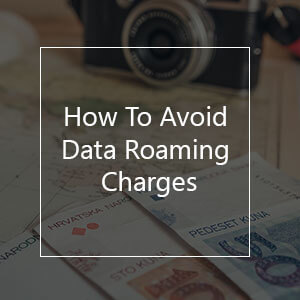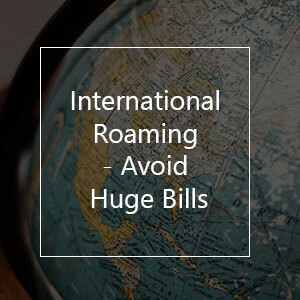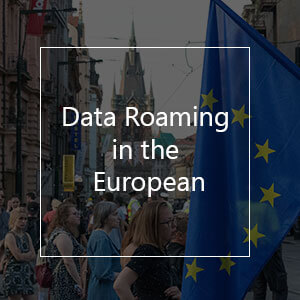Roaming when traveling abroad : A costly trap that can be easily avoided
With our ever-growing need for a connection to the Internet everywhere, Data Roaming became one of the highest stakes for the providers. Indeed, the use of internet abroad is now used as a sales pitch. But behind the commercial effort, there are a lot of risks for you as a consumer if you’re not aware of how it works. Take a look behind the scenes with us in order to understand better what is Roaming.
What is Roaming?
Simply put, it is when you use the Internet on your phone outside of the bounds given by your provider. Your phone will not catch your Mobile Network Operator’s signal, but the best signal available around. Then, the owner of the network you roamed on will send your data consumption to your operator.
Then, they will establish your bill according to the prices they agreed on beforehand. Problem is, the prices are very frequently excessive, and you’ll experience what some people call the “bill shock”. Also, some providers will lure you with international packages that are way overpriced.
Even worse, when you reach the limits of your allowance, you’ll be back to roaming rates without notice. Some people end up with monstruous bills this way.
The price of Roaming
Before we talk about excessive pricing, we shall take note of some positive points about Data Roaming. Since 2013, some mobile network operators started to renounce at roaming charges. While there are few, this is worth to be noted, and we invite you to check if your provider is in the list.
Also, if you happen to live in Europe, the EU recently put a price cap on roaming fares. Starting on June 15th of 2017, the price of the GB in Roaming will be capped to 7,7€. Further reduction is planned until 2022, when we will reach the cap of 2,5€ per GB.
But this kind of initiatives are really limited for now and depending on your home country and your destination, you can pay a lot. Most of the time, they will hide their prices by using really small quantities of data for the reference.
Let’s take the exemple of a very famous American provider. If you’re one of their subscribers, you will pay $0,002 per KB. “What a deal!”, you may think… Well, considering that there are 1024 kilobytes per megabyte, and 1024 megabyte per gigabyte, it’s not that much of a deal.
You’ll end up paying $2097 your GB of Internet without noticing. Also, providers charge extra on texts messages and calls. While it is not as impressive as with the data usage, you should always keep an eye on the prices. It can make a difference in your next trip’s budget.
Better solutions exist
Prepaid SIM Card
For your next trip, why don’t you try the Prepaid SIM Card? You’ll get the best prices compared to the local market, and you have the guarantee of not receiving the biggest phone bill of your entire life when you come back. Also, you’ll get minutes of calls and text messages in addition to the internet access.
The only problem with this method is that if you don’t own a Dual SIM Phone, you’ll have to take out your SIM to insert this one. This means you won’t be reachable on your usual number until you insert it back in.
The Pocket WiFi
If you are travelling in group, or simply if you are a heavy data user, you can check out the Pocket WiFi rentals. It’s a small device that broadcasts a high speed private network. You can connect up to ten different devices to this network.
This also allows you to keep your phone number, which is interesting if you plan to use WhatsApp. Be careful though, because this option does not provide phone service. If you need to call or send text messages, you’re better off with the Prepaid SIM Card.






